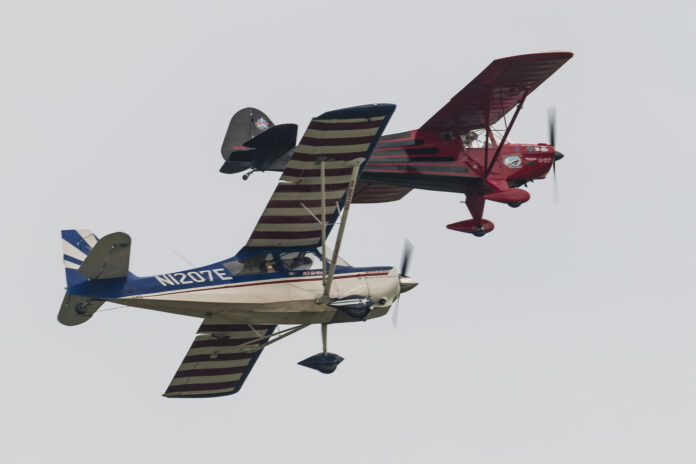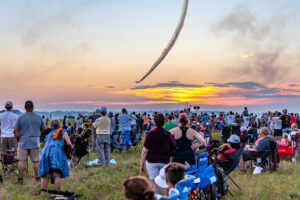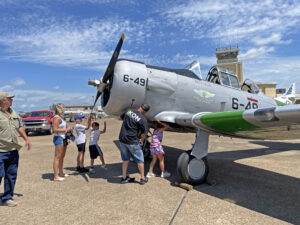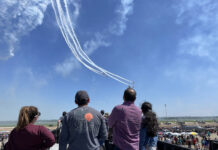
Understanding Needs and Creating Stronger Relationships
By Beth E. Stanton
Author’s note:
This article is the first of a two-part series. The first will delve into understanding what event organizers need from performers to optimize a smooth-running event. The second article, to be published in the near future, will focus on what performers require from producers to deliver a safe and dynamic show. Exploring priorities and pain points as they relate to the air show environment will foster better understanding between producers and performers — and strengthen professional industry relationships.
Any staged production includes a producer, director, cast, crew, and audience — and each plays a vital role in a show’s success. The million details required to pull off an air show requires open communication and clear expectations between all stakeholders. “How can we work together more?” said Dennis Dunbar, chairman of the ICAS board of directors and Director of Air Shows and Attractions at SUN ‘n FUN. “To me, it’s not an event organizer versus performer world. I think it hurts this business to put ourselves in these categories.”
Dewey Vinaya sees the industry from both vantage points. Vinaya, board president and air operations lead for the Stuart Air Show in Florida was a jumper with the Black Daggers 101st team for a decade. “I see both sides of the spectrum — where we are as producers, and where the performer side comes from,” he said.
“We should be a singular team working to produce fantastic events,” said Bobbi Thompson, founder of Thompson Aviation Consulting, Inc. and ICAS Foundation board and ICAS Safety Committee member. Thompson has a dual perspective — she flew in air races and air shows before becoming an air show consultant. “I always had an appreciation for the guy on the flight deck, and what it requires for them to be successful,” she said. “It is the synergy of the two parties working closely together to achieve success.”
Synergistic Success
The success of an air show can be measured in multiple ways, yet the top priority is always a safe show. “This has got to be safe,” Dunbar said. “Because whether we make money and inspire people and do all those great things or not, if we started having accidents at the shows, they are awfully hard to bounce back from.”
Quantifiable markers of success include strong attendance, revenue generation, positive local economic impact, and enthusiastic community response. “Did we have a safe show and set ourselves and performers up for success by creating an environment for them to excel while they are here?” said Ryan Kern, operator of the Duluth Air Show. “Did we do a good job of marketing our air show and performers so people are excited to come and see our line-up?”
“One, we measure the success based on our attendance,” said Barb Haluszka, executive director at Battle Creek Field of Flight Air Show & Balloon Festival in Michigan. “Two, I walk the grounds the entire time and get so much feedback.” The show also gets feedback from its 78,000 Facebook followers. “90 percent of them are thrilled with everything that we have going on here,” she said.
Making air show magic happen is a herculean effort that includes lots of paperwork, promotion, and collaboration.

Contracts
“Everything stems from the contract,” said Colin Stephenson, executive director of the Atlantic Canada International Air Show and ICAS board member. He noted there are different levels of sophistication when it comes to contracting services provided outside the air show performance. “I think that’s where everybody must get to — what are you contracting for? Is this person lending their personality, their media power, and the draw of their airplane to your organization for the season, or for a couple of days while they’re in town?
Performers most commonly provide the draft contract to the producer. “If you compare one contract to another, you can find wide variance of what they what they offer,” Stephenson said. It is important for all parties to have their relationships understood on paper. “As a member of the ethics committee, the first question we always ask when there’s a dispute is, ‘What does the contract say?’” Stephenson said.
Producers sometimes struggle getting contracts and other documents from performers. “They’re great pilots, but not so good at their paperwork,” Thompson said. “I feel it’s my responsibility to contact performers and to stay on them,” Haluszka said. “The sooner you can get a contract to me than life is just good for all of us.” Items needing extensive lead time to procure include hotel rooms, rental cars, and smoke and engine oil. “I don’t care if you call, text, or email me — just get back with us in a timely manner,” she said.
Promotion
Kern noted there are specific ways performers can help a show achieve success. “Create an image that tells the public who you are,” he said. “If we can market a performer and create a buzz around them, it gets people excited to attend the show.” Kern advised performers to invest in updated, high-definition marketing materials. “Too many performers don’t provide us with good marketing content and by default we leave them off our marketing campaign simply because we can’t build it for them,” he said.
Working with performers months before an event on social media campaigns helps build momentum for the show and excitement for the fans. “It’s important to me, but it is also important for our performers,” Dunbar said. “It’s good for the whole industry if our performers have a fan base.”
Dunbar provides performers with talking points before a show that includes its we-

bsite, what is unique about the show, its message, and what is being celebrated. This information can be used on social media and to get ready for the show. “They should be using that stuff when they arrive and somebody sticks a microphone in their face,” Dunbar said. “They can be camera- ready when they get here.”
While some air shows have a media day just prior to the event, most marketing — including billboards, print ads, radio and television spots, and school visits — happens months in advance. “One of the biggest things a performer can do to help support our efforts to market and promote them is to simply be available and willing to engage the public in events and activities in our community leading up to the show,” Kern said.
Particularly disappointing for producers is asking a performer to be available for an interview or participate in an outreach event only to be met with a “no.” “The reality is, air shows are perfectly suited to help performers market themselves at no expense to themselves and gain awareness, which in turn leads to potential more bookings and notoriety,” Kern said.
Collaboration
Part of a performer’s job at a show is interacting with sponsors, fans, and the media through autograph sessions, photo shoots, handshakes, and high fives. “Now, we have to be respectful of their rest time,” Thompson said. “But we need them interact with our crowds and help us promote the show.”
“I just want them to be willing to collaborate with the show,” Dunbar said. “But the performer needs to balance all this collaboration and teamwork so that we don’t talk them into getting out of their comfort zone in the airplane. We don’t talk them into doing so much stuff that they can’t focus on what they are doing.”
“I would not ask an air show performer who is flying up in the sky to be out in that hot damn sun in a flight suit, signing autographs and doing all these things,” Haluszka said. “I want them to be focused on getting prepared to be able to fly. They need to be able to chillax and have their head in the right place.”
However, a performer who is available for an autograph session after a flight, mingles with sponsors in the chalet, and poses for photos with adoring fans, helps to elevate the air show experience for all involved.
Air Show Family
Vinaya is selective about who performs at his show. “I will hire somebody, but before I sign a contract, I will always check with a performer that I trust, to find out who they are, and what they’re really like,” he said. “We work very hard to run an easy-going show. Somebody who comes in and just wants to disrupt that; we will not bring them back.”
“It’s a minority, not a majority, that you’ll have performers make demands,” Thompson said. “That can be tough. Some people want extra hotel rooms and rental cars, but they need to be respectful of our budgets so that we can pay them the prices they deserve.”
“Do they have the mindset, the attitude, they’re going to partner with your show?” Dunbar said. “Or are they just there to fly and that’s it?”
For a producer, a dream performer is one who gets their paperwork in complete and on time; engages prior to the show via social media, interviews, and community outreach; shows up when they’re supposed to; and interacts with sponsors and fans during the show. “A large majority of performers certainly take care of all this,” Thompson said. “You learn as an event organizer which ones are high maintenance and avoid them.”
Held over Veteran’s Day weekend, the Stuart Air Show is one of the last of the season. Each year, a home cooked “Stuartsgiving” dinner is prepared for performers and volunteers. “We have built a family environment,” Vinaya said. “We treat our performers like we would our family — like if our kids were home for the holidays.”
Like in all families, there can be misunderstandings and communication is crucial to maintain harmony. “Performers and producers should have open dialogue and understand that some air shows are not able to provide what a previous show site did,” Kern said. Since each show has a different set of logistical challenges, expectation can lead to disappointment. For example, some shows have limited hangar space available. “If we negotiate it into a contract, we set it aside for that performer,” Kern said. “Arriving and saying it’s required unfortunately doesn’t work for us.”
Communication is Key
During the ICAS Convention, Thompson has noticed that producers and performers tend to cluster in their respective groups. “Event organizers and performers should not meet in their little cliques,” she said. She believes that everyone should be meeting, talking, and sharing throughout the entire convention, not just over a drink at the bar. “Just because you’re talking to a performer doesn’t mean you have just signed a contract with him,” she said. “Talk to him and learn from him. Same for the performer — talk to the organizers. That doesn’t mean they have to sign you up for their next show. We’re all in the same family, we need to work together to be successful. Because communication is the key to everything.”








